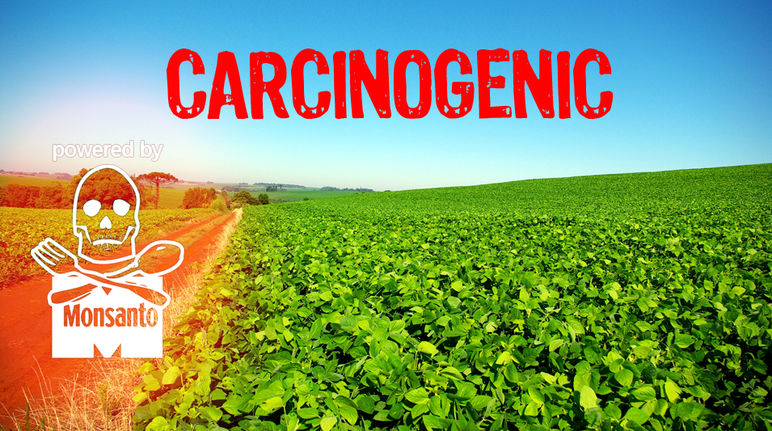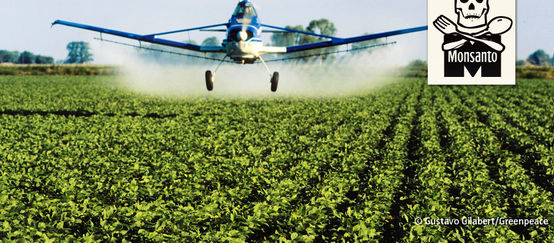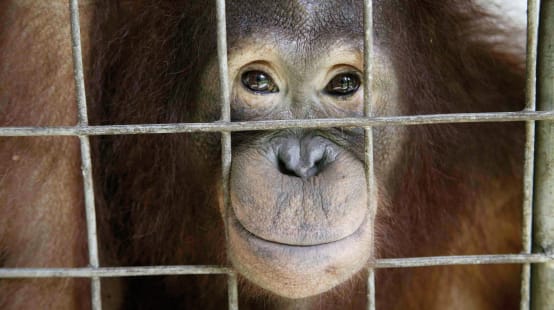Tell the EU to ban Monsanto’s glyphosate!
 © Tiago Fioreze - CC BY-SA 3.0 - Montage RdR
© Tiago Fioreze - CC BY-SA 3.0 - Montage RdR
Glyphosate is everywhere – the world’s best-selling herbicide is slowly poisoning the environment and our food supply. The World Health Organization classified it as a probable carcinogen, but that’s not stopping the EU from wanting to approve its use for another 15 years! Tell the EU and its member states to ban glyphosate in Europe.
News and updates Call to actionTo: The EU and member governments
“Glyphosate is a dangerous herbicide that does not belong in our food supply – the EU must not renew its approval!”
Glyphosate is the active ingredient in herbicides such as Monsanto’s Roundup. We are continually exposed to this chemical – 128,000 tons were sprayed in the United States alone in 2014, and it is the top-ranked herbicide for use on arable crops in the UK. As a consequence, glyphosate is not only accumulating in our soil and water, it can be found throughout our food supply – and in our blood and urine.
Last year, the International Agency for Research on Cancer (IARC) of the World Health Organization (WHO) concluded that glyphosate causes DNA and chromosomal damage to human cells and is probably carcinogenic.
By contrast, the European Food Safety Authority (EFSA) and the German Federal Institute for Risk Assessment (BfR) see no cause for alarm. According to the Guardian, however, dozens of pages of the EFSA's opinion were copied from a Monsanto study.
Nearly one hundred renowned scientists responded with an open letter describing EFSA’s finding as “flawed” and calling on the European Commissioner for Health and Food Safety and the European Commission to disregard it.
Despite the warnings, the European Commission intends to extend the approval of glyphosate for a further 15 years (see draft regulation and annexes). Experts from all 28 member states attended a closed-door meeting in Brussels on March 7, 2016 to vote on the extension. When it became clear that a majority in favor was uncertain, the decision was deferred. It will now be put to a vote in the European Parliament in October 2017.
This is the perfect window of opportunity to get glyphosate banned in Europe. Please sign our petition!
BackgroundEU voting procedure on glyphosate
Approval of the draft regulation would require a qualified majority of national experts sitting in the Standing Committee on Plants, Animals, Food and Feed. At least 55 percent of member states representing more than 65 percent of the EU population would have to vote in favor in a closed-door session.
If a qualified majority either in favor or against the extension is not reached on May 18, the decision will be deferred to an appeal committee.
The EU-wide approval for glyphosate is set to expire in December 2017. Agriculture could easily do without the pesticide – the impact would amount to a drop in yield of a few percent.
Chemical industry lobby drafts legislation
Chemical manufacturers have no intention of losing billions in sales of glyphosate products. Industry lobbyists are constantly present in Brussels and other European capitals and are working successfully to shape legislation in their favor.
Instead of applying the precautionary principle and banning potentially hazardous substances, the European authorities perform risk assessments on the basis of dubious data. The studies they use for this purpose have mainly been commissioned by the pesticide manufacturers themselves and have in some cases not been published. The findings are thus neither scientifically neutral nor reproducible.
Scope of studies completely inadequate
In addition, the EU assessment is limited only to the active ingredient glyphosate. However, the products of manufacturers such as Monsanto (Roundup), Bayer, BASF, Dow Chemical and Syngenta also contain additional toxic substances that represent health hazards. The mixtures could thus have broader health impacts than glyphosate alone.
The International Agency for Research on Cancer (IARC) of the World Health Organization (WHO) therefore studied the health impact of commercial glyphosate products. The IARC concluded that glyphosate causes DNA and chromosomal damage to human cells and is probably carcinogenic. For more detailed information, please see the glyphosate monograph on the IARC website.
Polyethoxylated tallowamine (POEA) is a substance frequently added to glyphosate products. The surfactant increases the uptake of glyphosate in living beings. With regard to POEA, the European Food Safety Authority (EFSA) concludes that the available data are not sufficient to perform a risk assessment in the field of human and animal health, that no information is available on residues in plants and livestock, and that the genotoxicity, long-term toxicity and carcinogenicity, reproductive/developmental toxicity and endocrine disrupting potential of POEA require further clarification. Despite these glaring gaps, the authorities and the European Commission nevertheless gave the green light for glyphosate products.
The environment: the chemical industry’s test lab
Little is known about the effects of glyphosate in the environment, such as its impact on frogs or toads migrating through sprayed fields or tadpoles living in neighboring streams and ponds. Scientists suspect a link between glyphosate and the worldwide decline of amphibian populations. The German Federal Environment Agency (UBA) considers glyphosate a danger to human health, the environment and biodiversity and is calling for restrictions on its use (in German).
Many plants such as corn, soy and cotton have been genetically modified to make them resistant to glyphosate. The herbicide can thus be applied directly to such crops. in South America alone, 40 million hectares – an area 60% larger than the UK – have been planted with monocultures of genetically modified soy. Every year, the EU imports millions of tons of genetically modified soy as livestock feed, and the fashion industry uses genetically modified cotton for our clothing.
To: The EU and member governments
Ladies and Gentlemen,
We are very concerned about the European Commission’s proposed extension of the approval of glyphosate in the EU until the year 2031.
The International Agency for Research on Cancer (IARC) of the World Health Organization (WHO) has concluded that glyphosate causes DNA and chromosomal damage to human cells and is probably carcinogenic.
Some European authorities do not share this assessment. Meanwhile, however, glyphosate can be detected in foods such as milk, flour, bread and beer.
Rather than applying the precautionary principle to protect the health of Europeans, the risk assessments of the European Food Safety Authority (EFSA) and the German Federal Institute for Risk Assessment (BfR) cater mainly to the business interests of chemical manufacturers.
Nearly one hundred scientists, including almost the entire team of the IARC, have leveled serious accusations against EFSA and BfR, pointing out major flaws in the assessments, scientifically unacceptable procedures and incomplete data.
Please ensure that glyphosate’s approval in the EU is NOT extended. We also call on you to reform the risk assessment procedures used by public authorities. Thank you.
Kind regards,














 Recent successes
Recent successes